On Oct. 24, UC Davis student leaders and representatives met with University of California President Janet Napolitano in a closed meeting. Napolitano spent two days at UC Davis to meet with students, faculty and the administration as part of her listening and learning tour of all the UC campuses.
UC Davis students and teaching assistants protested the visit from the newly elected UC president, which began at the Memorial Union and ended at the Welcome Center.
Students raised issues and concerns such as the campus climate, retention rates, support for undocumented AB540 students, and lack of student input in many of UCOP’s policies.
Napolitano opened the discussion by introducing herself and providing her professional background. She was previously the Secretary of Homeland Security and a two-time governor of Arizona.
“I’ve had a lot of experience managing large, complex public institutions,” Napolitano said. “What I can do is the nuts and bolts — how many, how much will it cost, are we attracting students in various fields that we want to attract.”
She also expressed interest in a continuance of these meetings to expand her knowledge of the student issues.
Napolitano urged students to continue working in their capacity as student leaders to organize students and lobby for the issues they are advocating. Her power as president is largely limited to UC-wide policies. She has initiated a top-down and bottom-up efficiency review in the time she has been president.
“You would be surprised by how many people look at a piece of paper before a decision is made,” Napolitano said. “It’s hard to ask the taxpayers to give us more money without showing that we are making the most of their money.”
Protesters are upset about the lack of transparency in Napolitano’s actions. They question the lack of student democracy involved in how Napolitano came to office and how the student representatives were decided.
“Janet Napolitano? Where did she come from? What business does she have at the UC and why weren’t students given a voice in her representing the university?” asked Rebecca Hernandez, a fifth-year political science major.
Chancellor Linda P.B. Katehi claims that Napolitano was elected through the traditional process. According to Katehi, UC Regents created a group led by the chair of the board. This group spoke with UC chancellors and an advisory group from the Senate and together eventually selected the UC president from a long list of nominations. Katehi claims that neither the chancellors nor the Senate voted for the president.
“The chancellors did not vote; the Senate did not vote. This is not a unique process for the UC system. It’s a process that many other universities are following. There is no vote that goes,” Katehi said.
According to Adela de la Torre, UC Davis vice chancellor, the student body president and different campus groups nominated the students who were able to speak with Napolitano. Katehi claims that due to Napolitano’s strict schedule meeting with other university representatives, she had no control over the process for Napolitano’s student conference.
Protesters are also concerned about the safety of undocumented students and workers on campus due to Napolitano’s history as the former U.S. Secretary of Homeland Security. Protesting students demand Napolitano make campuses across the UC system sanctuaries for undocumented students and workers to protect them against deportation.
“We want our undocumented students to be safe. We want the UC system to be a safe space for them so they won’t be scared to even attend classes,” said Abrahan Tapia, a fifth-year psychology major.
Protesters also demand undocumented TAs receive the same benefits as those who are documented.
“There are some TAs out here who are also undocumented that don’t get the same pay that regular TAs do. They also don’t get the same benefits, like health care, because of them being undocumented,” said Ilse Lopez, a second-year.
For Guadalupe Espinoza, a second-year human development major, Napolitano’s deportation record is disconcerting.
“During her term, there [were] more deportations in history. It wasn’t just the deportations of criminals, it was the deportation of families, it was the separation of families and there was deportation of AB 540 students,” Espinoza said.
According to AB 540, undocumented students are unable to qualify for financial aid, both state and federal, such as FAFSA money or BOG waivers due to not having a legal status in the United States.
“For people who are trying to access the American dream, part of that is education. And a means of that is a public institution, like the UC system,” said Marissa Cuevas, a fourth-year sociology major.
Due to a recent University contract that cut into the wages and pensions of UC workers, members of the UAW Local 2865, the TA union, are fearful of the same cuts happening to them.
“They’ve already sent the message that they don’t care about their AFSCME workers by implementing an unfair contract. What are UAW workers going to think is going to happen to them?” Hernandez said.
For Duane Wright, a member of the UAW Local 2865, he’d like to see Napolitano implement better working conditions for TAs. According to Wright, TAs are overworked with too many students, which negatively affects the education of undergraduates.
“As a TA, if I’m overworked and have too many students then that’s going to affect my students because then they’re not going to get enough one-on-one time. I can’t give enough good feedback to them. I can’t provide the mentorship. I can’t be there for emotional support, etc. So our working conditions are their learning conditions,” Wright said.
Along with lower class sizes, protesting TAs also demand higher pay for their work.
“The UC prestige goes down when we have 500-person classes instead of a serious education. And it’s bad for graduate students who are overworked and have to choose between serving their students and getting paid a decent wage,” said Caroline Mckusick, a Ph.D. student in anthropology.
Due to Napolitano’s background, many protesters worry about an increase in surveillance on campus.
“One of the things we’re talking about is any surveillance on students and guaranteeing freedom of expression. Being able to freely protest or do sit-ins are becoming less and less okay on the campus, so we want to make sure we can continue to do that,” said Deirdre Morris, UAW Local 2865 member.
According to Torre, Napolitano is interested in making UC schools sanctuaries and implementing fair contracts for campus workers.
Future plans for protesters include supporting ASFCME 32999, the university labor union, if they vote to strike on Oct. 30.
“During the 2008 election cycle, UC workers spent even more than the university in support of Prop 30. The workers care about our education being funded than the university itself. It’s about students and workers standing together,” said Ian Lee, a third-year environmental science major.
According to Hernandez, Napolitano has seen major protests on almost every UC campus.
“This is not just happening at Davis. This is something that’s happened at Berkeley. It’s happened at UCLA. It’s happened at Irvine and Riverside. Students, UC-wide are upset. We want to put pressure and we want to make changes. This should be our university,” Hernandez said.


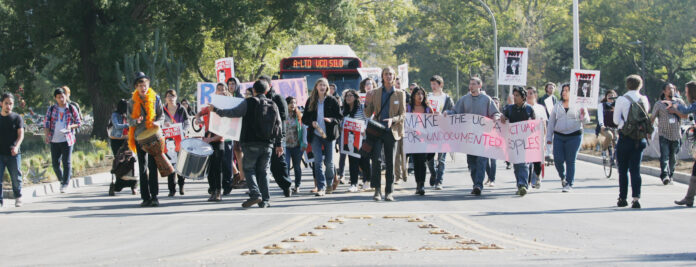
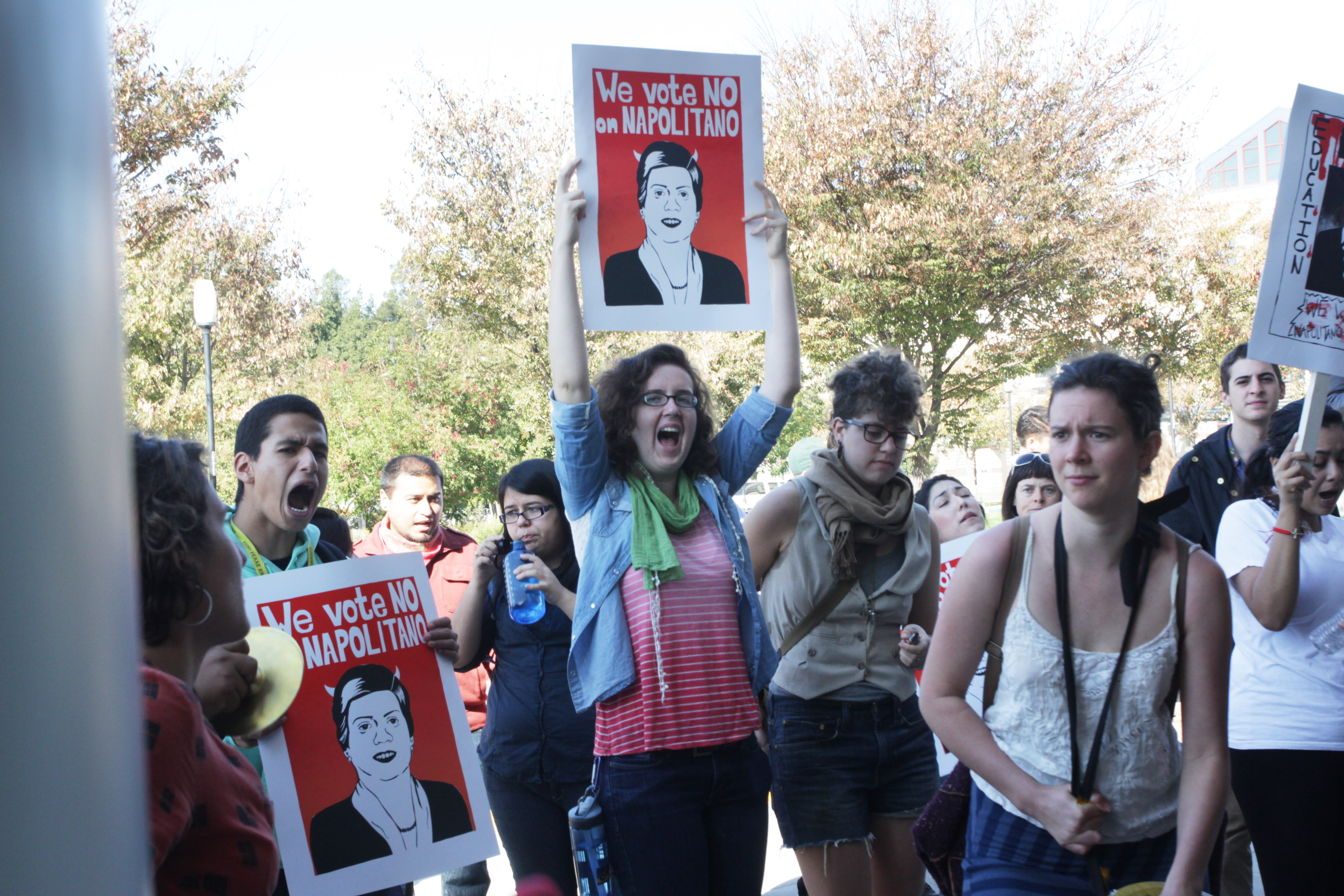
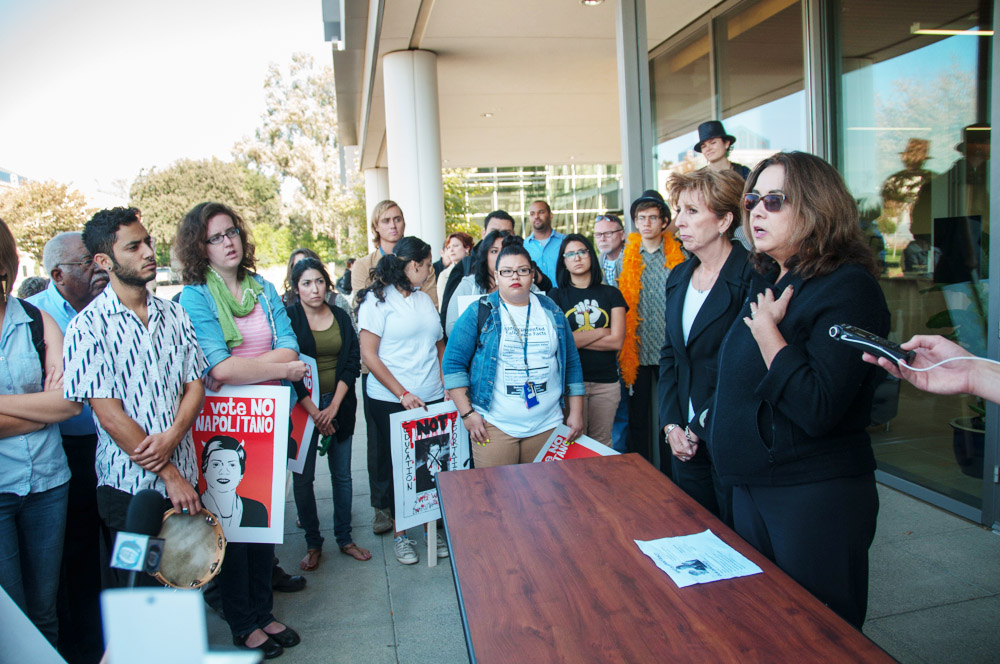
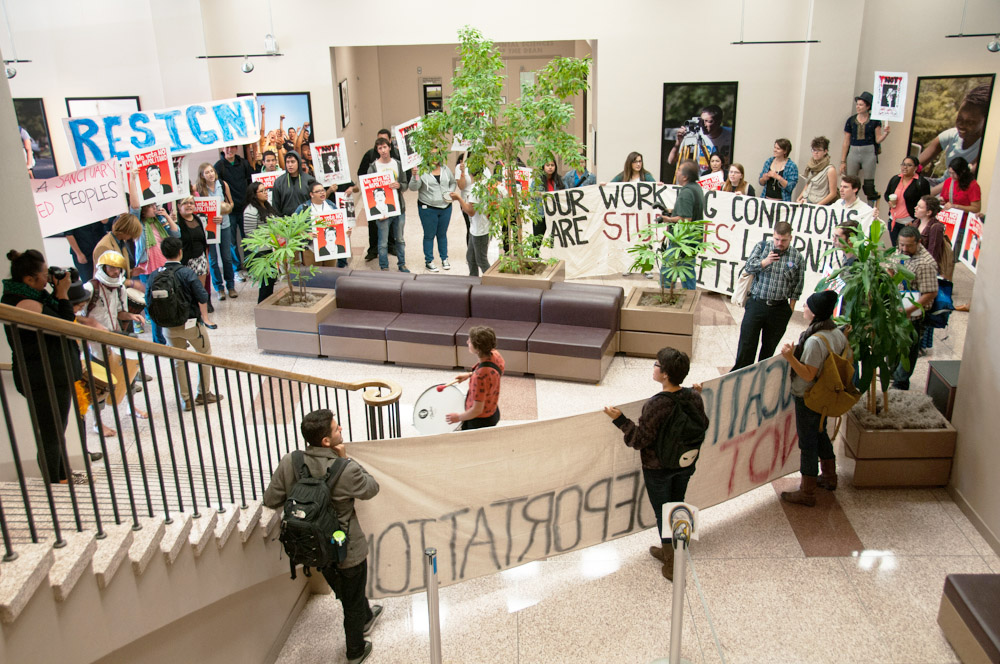
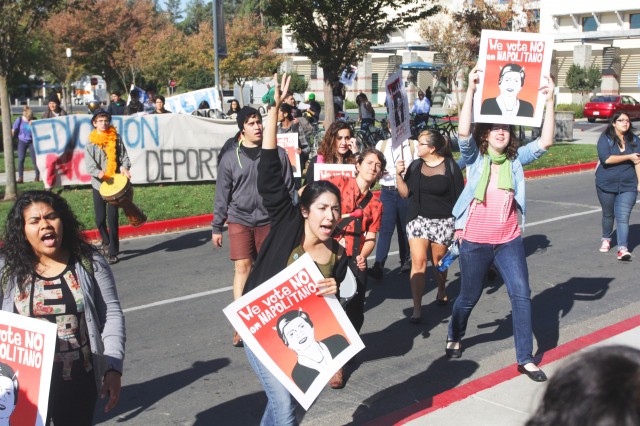

[…] of California to spend $5 million to help undocumented studentsReutersUC president visits Davis campusThe AggieUC President Pledges $5 Million To Support Students Living Illegally In The U.S.Neon […]